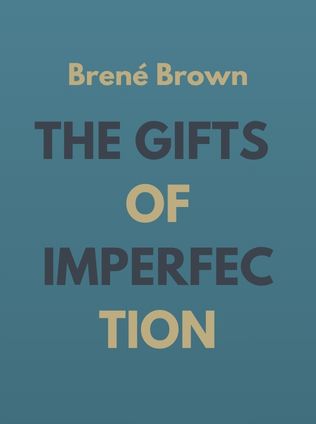
The Gifts of Imperfection
By Brené Brown
Published 08/2010
About the Author
Brené Brown is a research professor at the University of Houston and has spent over two decades studying courage, vulnerability, shame, and empathy. Her work has made her a leading voice in the fields of social work and psychology. Brown’s TED Talk, "The Power of Vulnerability," catapulted her into the public eye and has been viewed millions of times. She has authored several bestsellers, including The Gifts of Imperfection, published in 2010, which continues to resonate with readers for its profound exploration of self-acceptance and living authentically. Through her research, Brown has empowered countless individuals to embrace their imperfections and lead more fulfilling lives by finding strength in their vulnerabilities.
Main Idea
In The Gifts of Imperfection, Brené Brown introduces the concept of "Wholehearted living," a way of life that encourages embracing our imperfections and cultivating a deep sense of worthiness. The book outlines ten guideposts for Wholehearted living, which help individuals develop self-compassion, authenticity, and resilience. Brown’s central thesis is that by letting go of the fear of imperfection and embracing vulnerability, we can live more meaningful, joyful, and connected lives. She challenges readers to abandon the societal pressures of perfectionism and instead focus on living a life that is true to their authentic selves, grounded in self-acceptance and courage.
Table of Contents
- Introduction: Courage, Compassion, and Connection
- What Is Wholehearted Living?
- The Power of Worthiness
- Shame: The Barrier to Worthiness
- Cultivating Authenticity
- Letting Go of Perfectionism
- Building Resilience
- The Importance of Self-Compassion
- Finding Meaning in Our Lives
- Embracing Rest and Play
- Practicing Gratitude and Joy
- The Power of Laughter, Song, and Dance
The Power of Worthiness
At the heart of The Gifts of Imperfection is the concept of worthiness. Brown defines worthiness as the belief that we are enough as we are, flaws and all, and that we deserve love and belonging simply because we exist. This idea challenges the pervasive belief in modern society that self-worth is tied to external validation and accomplishments. Brown argues that cultivating a sense of worthiness is essential to living a Wholehearted life because it allows us to be authentic, compassionate, and connected with others.
"Worthiness doesn’t have prerequisites." — Brené Brown
Brown begins by discussing the widespread issue of low self-esteem, which she attributes to societal pressures, experiences of trauma, and the constant comparison to others. These feelings of inadequacy can prevent us from living fully and engaging in meaningful relationships. To overcome this, Brown emphasizes the importance of developing a strong sense of self-worth that is independent of external validation.
The notion of worthiness is foundational to Brown’s concept of Wholehearted living. It serves as the bedrock upon which all other aspects of our lives are built. Without a sense of worthiness, it is difficult to live authentically or to develop meaningful connections with others. Brown encourages readers to challenge the societal norms that dictate who is worthy of love and belonging and to embrace the idea that everyone is inherently worthy.
Shame: The Barrier to Worthiness
One of the most significant barriers to developing worthiness, according to Brown, is shame. Shame is the deeply ingrained belief that we are not good enough and that we do not deserve love or belonging. Brown describes shame as a pervasive and insidious emotion that affects everyone, but particularly those who are striving for perfection. Unlike guilt, which is about feeling bad for something we've done, shame is about feeling bad for who we are. Brown explains that shame thrives in secrecy and silence, and it can only be dismantled by bringing it into the light and speaking about it openly.
"Shame is the intensely painful feeling or experience of believing that we are flawed and therefore unworthy of love and belonging." — Brené Brown
To combat shame, Brown introduces the concept of "shame resilience." Shame resilience involves recognizing when we are experiencing shame, understanding its triggers, and responding to it in a healthy way. This includes reaching out to others for support, challenging the internal narratives that fuel shame, and practicing self-compassion. Brown emphasizes that by building shame resilience, we can protect our sense of worthiness and live more authentic and connected lives.
Brown also discusses the societal factors that contribute to shame, such as unrealistic standards of beauty, success, and behavior. She argues that these standards perpetuate feelings of inadequacy and fuel the cycle of shame. By recognizing and challenging these societal pressures, individuals can begin to dismantle the shame that holds them back from living Wholeheartedly.
Cultivating Authenticity
Cultivating authenticity is one of the key guideposts for Wholehearted living. Brown defines authenticity as the daily practice of letting go of who we think we’re supposed to be and embracing who we are. This involves being honest with ourselves and others about our true feelings, desires, and experiences. Brown argues that authenticity is crucial for building self-worth because it allows us to show up in the world as our true selves, rather than as the version of ourselves that we believe others want to see.
Sign up for FREE and get access to 1,400+ books summaries.
You May Also Like
The Subtle Art of Not Giving a F*ck
A Counterintuitive Approach to Living a Good Life
By Mark MansonRich Dad Poor Dad
What the Rich Teach Their Kids About Money - That the Poor and Middle Class Do Not!
By Robert T. KiyosakiHow To Win Friends and Influence People
The All-Time Classic Manual Of People Skills
By Dale CarnegieFreakonomics
A Rogue Economist Explores the Hidden Side of Everything
By Steven D. Levitt and Stephen J. Dubner



















